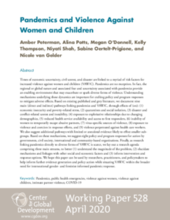Abstract
Times of economic uncertainty, civil unrest, and disaster are linked to a myriad of risk factors for increased violence against women and children (VAW/C). Pandemics are no exception. In fact, the regional or global nature and associated fear and uncertainty associated with pandemics provide an enabling environment that may exacerbate or spark diverse forms of violence. Understanding mechanisms underlying these dynamics are important for crafting policy and program responses to mitigate adverse effects. Based on existing published and grey literature, we document nine main (direct and indirect) pathways linking pandemics and VAW/C, through effects of (on): (1) economic insecurity and poverty-related stress, (2) quarantines and social isolation, (3) disaster and conflict-related unrest and instability, (4) exposure to exploitative relationships due to changing demographics, (5) reduced health service availability and access to first responders, (6) inability of women to temporarily escape abusive partners, (7) virus-specific sources of violence, (8) exposure to violence and coercion in response efforts, and (9) violence perpetrated against health care workers. We also suggest additional pathways with limited or anecdotal evidence likely to effect smaller subgroups. Based on these mechanisms, we suggest eight policy and program responses for action by governments, civil society, international and community-based organizations. Finally, as research linking pandemics directly to diverse forms of VAW/C is scarce, we lay out a research agenda comprising three main streams, to better (1) understand the magnitude of the problem, (2) elucidate mechanisms and linkages with other social and economic factors and (3) inform intervention and response options. We hope this paper can be used by researchers, practitioners, and policymakers to help inform further evidence generation and policy action while situating VAW/C within the broader need for intersectional gender- and feminist-informed pandemic response.

